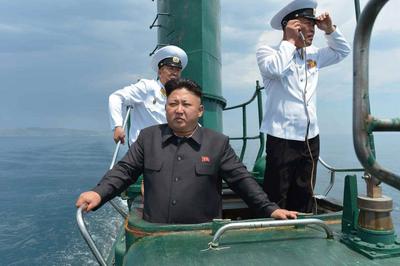The British defence attaché will be based in Beijing and the North Korean attaché in Moscow. But Hugo Swire’s comments are surprising, in light of Britain’s past experience of sending attachés to the country.
It is not easy to engage with the Korean Workers’ Party in Pyongyang, and it is even harder to engage with the military. In my experience as Britain’s first ever diplomatic representative to Pyongyang, the attachés were kept at a distance. The resident defence attaché corps would regularly express their frustration that while the Korean People’s Army (KPA) treated them with great respect they were kept firmly at arm’s length. They complained that they never saw an exercise and never penetrated a military establishment, except for the rather nicely appointed guesthouse. I got inside the guest house three times myself (once when the Foreign Office’s most senior civil servant came to Pyongyang, once when I made an introductory call, and finally for my farewell call). All other attempts at contact were politely refused. Even the attachés of favoured countries such as Russia, China and Iran seemed to be treated in the same way.
That North Korea might be interested in having a defence attaché accredited to London is not surprising. The surprise is that Britain agreed.
When Britain negotiated the agreement on diplomatic relations back in December 2000, the North Korean side asked about an exchange of attachés towards the end of the discussions and was refused. A North Korean attaché in London would be just an additional burden on the Security Services, with no discernible benefit for Britain. As for a British attaché in Pyongyang, at that stage there was no plan to have a permanent establishment there. Britain’s representative would be based in Seoul, making occasional visits to Pyongyang.
It was on that basis that I was appointed the first British representative (chargé d’affaires) in January 2001.
All that changed when then permanent under secretary Sir John Kerr came to Pyongyang in April 2001. He swiftly decided that there was no point in relations without a permanent presence. The North Koreans proved cooperative, within limits, and that is how I came to be based in Pyongyang. Sir John did call on the military, to whom he offered training in English and contact through sport. But there was no response then or when I tried to implement the idea.
So what will the new arrangements bring? In the first instance, not a great deal.
The British defence attaché in Beijing, who will now also cover Pyongyang, are already pretty stretched and will not find it easy to make time to go to North Korea. And when visits take place, it is likely that they will be very formulistic: a couple of banquets and a couple of conversations, a meeting with the resident attachés then back to Beijing to take off the weight gained. The DPRK attaché in Moscow, who is to be accredited to London, will probably also be a rare visitor — if only due to cost. When they do come they will be treated in a similar fashion to their British counterpart, with much ceremony and little content.
Yet the move is to be welcomed.
Isolating North Korea, or allowing North Korea to isolate itself, has failed to improve regional security. The US ‘missing in action’ program (which sought to locate the bodies of US soldiers missing since the Korean War) and paralleled the Agreed Framework in the Clinton years, may now be largely forgotten but it brought the KPA and the US military together in ways unimaginable in the 1980s. The British exchange of defence attachés is not in the same league as that program and it may lead nowhere. But it is a welcome step.
Jim Hoare is a Research Associate at the Centre of Korean Studies at the School of Oriental and African Studies, University of London. He was the first British representative to the Democratic People’s Republic of Korea, where he served as chargé d’affaires from January 2001 until October 2002.

